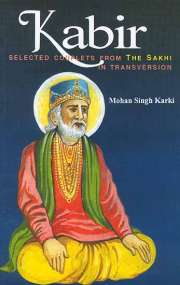|
Биография Kabir
Kabir este discipolul renumitului ascet hindus Ramananda.
Kabir se numără printre cei mai mari poeți din lume, biografia lui Kabir, însă, este înconjurată de legende contradictorii, neputându-se avea încredere în nici una dintre ele. Unele au o sursă hindusă, alta musulmană, susținând că a fost ba sufi, ba un sfânt brahman. Numele lui e o dovadă convingătoare că a provenit dintr-o familie de musulmani și cea mai probabilă variantă este cea după care Kabir a fost copilul natural sau înfiat al unui țesător musulman.
Kabir a fost mai mult decât un poet, a fost un om al spiritului, un înțelept, un reformator religios și întemeietorul unei școli care numără și azi aproape un milion de hinduși, dar Kabir rămâne pentru noi poetul mistic. Kabir a urât orice exclusivism religios și a căutat mai înainte de toate să-i inițieze pe oameni în libertatea divină. În paralel cu viața lui interioară de iubire și închinare, cu expresia ei artistică în muzică și cuvinte – căci a fost un muzician la fel de meșteșugit ca poetul – a trăit viața sănătoasă și sârguitoare a meșteșugarului oriental. Toate legendele cad de acord asupra acestui punct din biografia sa: Kabir a fost de meserie țesător, un om simplu, fără carte, care și-a câștigat traiul din războiul de țesut. Kabir nu a fost un ascet, a fost un om căsătorit și tată de familie. Poezia mistică poate fi definită pe de o parte ca o reacție temperamentalăla viziunea Realității; pe de altă parte, ca o formă de profeție. Iată ce spune Kabir: "Dumnezeu este în noi și totuși alergăm în căutarea Lui. Unii îl caută în cărțile sfinte, devenind plini de cunoaștere inutilă, alții în locurile sfinte, adorând lucruri moarte. Privește în tine: trupul tău este templul Lui, El te-a ales deja, și-a făcut sălaș în tine. Nenumărate vieți l-ai căutat aiurea fără
să-L găsești și în tot acest timp El era în tine, așteptând răbdător."
****
Kabīr (also Kabīra) (Hindi: कबीर, Punjabi: ਕਬੀਰ, Urdu: کبير (1398—1518) was a mystic composer and saint of India, whose literature has greatly influenced the Bhakti movement of India.
Kabir was raised by childless Muslim weavers named Niru and Nimma, who found him near Lahara Tara lake, adjacent to the holy city of Varanasi. But his birth is surrounded by legends. The most popular belief is that being the supreme power, he appeared in form of a baby. He was never "born" as such.
He was a Bhakti saint, who sang the ideals of seeing all of humanity as one, his name, Kabir, is often interpreted as Guru's Grace. He kept himself away from the fundamentalism of all the religions and explained the root philosophies of spirituality.
A weaver by profession, Kabir ranks among the world's greatest poets. In India, he is perhaps the most quoted author. The Holy Guru Granth Sahib contains over 500 verses by Kabir. The Sikh community in particular and others who follow the Holy Granth, hold Kabir, a Bhagat, in high reverence.
Kabir openly criticized all sects and gave a new direction to Indian philosophy. This is due to his straight forward approach that has a universal appeal. It is for this reason that Kabir is held in high esteem all over the world. To call Kabir a universal Guru is not an exaggeration.
He is also considered one of the early northern India Sants. One source for modern adaptations of Kabir's poetry is Robert Bly's The Kabir Book: Forty-Four of the Ecstatic Poems of Kabir.
"The poetry of mysticism might be defined on the one hand as a temperamental reaction to the vision of Reality: on the other, as a form of prophecy. As it is the special vocation of the mystical consciousness to mediate between two orders, going out in loving adoration towards God and coming home to tell the secrets of Eternity to other men; so the artistic self-expression of this consciousness has also a double character. It is love-poetry, but love-poetry which is often written with a missionary intention. Kabîr's songs are of this kind: out-births at once of rapture and of charity. Written in the popular Hindi, not in the literary tongue, they were deliberately addressed—like the vernacular poetry of Jacopone da Todì and Richard Rolle—to the people rather than to the professionally religious class; and all must be struck by the constant employment in them of imagery drawn from the common life, the universal experience. It is by the simplest metaphors, by constant appeals to needs, passions, relations which all men understand--the bridegroom and bride, the guru and disciple, the pilgrim, the farmer, the migrant bird--that he drives home his intense conviction of the reality of the soul's intercourse with the Transcendent. There are in his universe no fences between the "natural" and "supernatural" worlds; everything is a part of the creative Play of God, and therefore--even in its humblest details—capable of revealing the Player's mind."
His poems resonate with praise for the true guru who reveals the divine through direct experience, and denounced more usual ways of attempting god-union such as chanting, austerities etc. His verses, which being illiterate he never expressed in writing and were spoken in vernacular Hindi, often began with some strongly worded insult to get the attention of passers-by. Kabir has enjoyed a revival of popularity over the past half century as arguably the most acceptable and understandable of the Indian saints, with an especial influence over spiritual traditions such as that of Sant Mat and Radha Soami. Prem Rawat ('Maharaji') also refers frequently to Kabir's songs and poems as the embodiment of deep wisdom.
|





